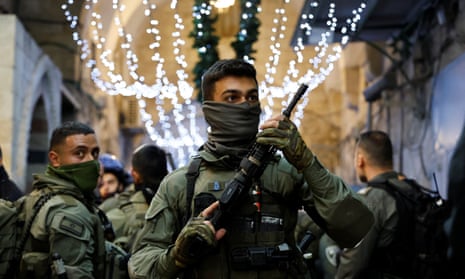Rocket fire from Lebanon and Gaza hits Israel after second al-Aqsa mosque raid

Palestinian territories
Rocket fire from Lebanon and Gaza hits Israel after second al-Aqsa mosque raid
Israeli army says salvo fired from Lebanese territory, after officers entered religious compound to remove worshippers
Rocket fire from Gaza and Lebanon and a second Israeli police raid on Jerusalem’s al-Aqsa mosque in as many nights have stoked fears of further escalation in the region during a sensitive period of overlapping religious holidays.
Palestinian militants in the blockaded Gaza Strip launched about nine rockets into Israel in the early hours, setting off air raid sirens across the south of the country but causing no casualties or damage. Most of the rockets exploded before impact, the Israeli army said, and none of Gaza’s militant groups claimed responsibility.
Two rockets were fired just before the second incident at the holiest Jerusalem site late on Wednesday and early on Thursday, in which police using stun grenades and rubber bullets entered the compound to remove worshippers. Six people were injured, according to the Palestinian Red Crescent.
On Thursday afternoon, the Israeli army said a salvo was fired from Lebanese territory into northern Israel for the first time in a year, leading to two minor injuries. There was no immediate claim of responsibility, but the launches came just hours after the Lebanese militant group Hezbollah said it would support “all measures” taken by Palestinians to defend al-Aqsa.
Hezbollah-affiliated media said Israel had shelled the southern town of al-Qlaileh in response. Israel’s prime minister, Benjamin Netanyahu, announced the security cabinet would be convened for the first time since February to analyse the situation.
The latest flare-up followed a large Israeli police raid on al-Aqsa the day before, in which at least 12 people were injured and more than 350 arrested. That raid triggered rocket fire from the Gaza Strip, which was countered with Israeli airstrikes on alleged military sites belonging to Hamas, the Islamist movement in control of the strip. The raid drew widespread condemnation in the Muslim world and concern from the White House
The two straight days of violence during the Muslim holy month of Ramadan and the beginning of the Jewish Passover holiday came after a year of spiralling bloodshed in the Israeli-Palestinian conflict. It also carried echoes of 2021, when clashes at al-Aqsa during Ramadan helped start an 11-day war between Israel and Hamas.
“We are not interested in an escalation but we are ready for any scenario,” said Daniel Hagari, an Israeli military spokesperson.
Elsewhere, clashes broke out overnight between protesters and police in the Arab-majority town of Umm al-Fahm in northern Israel and a Palestinian teenager was shot and lightly wounded by an Israeli civilian in Jerusalem’s Old City.
The Palestinian foreign ministry said the UN security council would hold a closed-door session on Thursday to discuss the violence since Wednesday’s raid, which Israeli authorities said was an attempt to prevent clashes by clearing groups barricaded inside with weapons, rocks and firecrackers, planning to breach the peace.
The Jordanian organisation that manages the site, known as the Waqf, said along with witnesses that police entered the mosque before prayers were over.Quick Guide
Where is al-Aqsa mosque and why is it significant to Muslims?
Show
Nabil Abu Rudeineh, a spokesperson for the Palestinian president, Mahmoud Abbas, said: “Israel’s raid into al-Aqsa mosque, its assault on worshippers, is a slap to recent US efforts which tried to create calm and stability during the month of Ramadan.”
Abu Obaida, a spokesperson for Hamas’s military wing, said: “The patience of the resistance forces in Gaza is running out. We won’t leave the worshippers at al-Aqsa mosque alone.”
The Temple Mount in occupied East Jerusalem, known to Muslims as al-Haram al-Sharif or as al-Aqsa, is holy to Jews and Muslims and is regularly the scene of violence. Security and diplomatic officials have warned that this year’s overlap of Ramadan and Passover has increased the potential for escalation.
We won’t leave the worshippers at al-Aqsa mosque alone
We won’t leave the worshippers at al-Aqsa mosque alone
We won’t leave the worshippers at al-Aqsa mosque alone
We won’t leave the worshippers at al-Aqsa mosque alone
We won’t leave the worshippers at al-Aqsa mosque alone
We won’t leave the worshippers at al-Aqsa mosque alone
We won’t leave the worshippers at al-Aqsa mosque alone
We won’t leave the worshippers at al-Aqsa mosque alone
We won’t leave the worshippers at al-Aqsa mosque alone
We won’t leave the worshippers at al-Aqsa mosque alone
We won’t leave the worshippers at al-Aqsa mosque alone
We won’t leave the worshippers at al-Aqsa mosque alone
We won’t leave the worshippers at al-Aqsa mosque alone
We won’t leave the worshippers at al-Aqsa mosque alone
We won’t leave the worshippers at al-Aqsa mosque alone
We won’t leave the worshippers at al-Aqsa mosque alone
We won’t leave the worshippers at al-Aqsa mosque alone
We won’t leave the worshippers at al-Aqsa mosque alone
We won’t leave the worshippers at al-Aqsa mosque alone
We won’t leave the worshippers at al-Aqsa mosque alone
We won’t leave the worshippers at al-Aqsa mosque alone
We won’t leave the worshippers at al-Aqsa mosque alone
We won’t leave the worshippers at al-Aqsa mosque alone
We won’t leave the worshippers at al-Aqsa mosque alone
Muslims often spend the night in the mosque compound during Ramadan, but the Waqf agreed this year that worshippers would not be allowed to stay in the house of prayer overnight for at least the first 20 days of the holiday.



Post a Comment